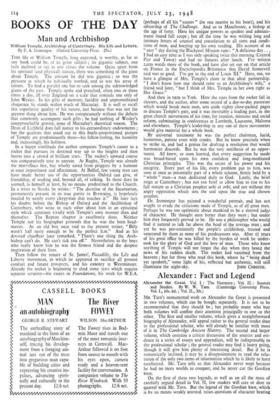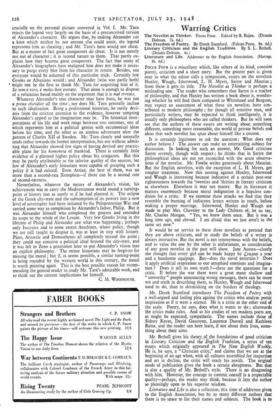Alexander : Fact and Legend
"MR. Tarn's monumental work on Alexander the Great is presented in two volumes, which can be bought separately. It is not to be recommended that they should be ; but probably many who buy both volumes will confine their attention principally to one or the other. The first and smaller volume, which gives a straightforward biography of Alexander, will appeal rather to the general reader than to the professional scholar, who will already be familiar with most of it in The Cambridge Ancient History. The second and larger volume, which contains a critical discussion of the sources and evi- dence in a series of essays and appendices, will be indispensable to the professional scholar ; the general reader may find it heavy going, though it will give him plenty of interesting detail. But if he is romantically inclined, it may be a disappointment to read the refu- tation of the only two items of information which he is likely to have recollected. Mr. Tarn tells us that Alexander never wept because he had no more worlds to conquer, and he never cut the Gordian knot.
On the first of these two legends, as well as on all the mass of carefully argued detail in Vol. II, few readers will care or dare to quarrel with Mr. Tarn. But the legend of the Gordian knot, which . is by no means weakly attested, raises questions of character bearing crucially on the personal picture conveyed in Vol. I. Mr. Tarn rejects the legend very largely on the basis of a preconceived version of Alexander's character. He argues that, by making Alexander cut a knot which neither he nor anyone else could untie, the legend represents him as cheating ; and Mr. Tarn's hero would not cheat. But as a matter of fact great conquerors do cheat. It is not merely not out of character ; it is second nature to them. That partly ex- plains how they become great conquerors. The fact that many of Alexander's biographers have maligned him does not make it neces- sary to purge every blot from his character in return. Besides, not everyone would be ashamed of this particular trick. Certainly few Greeks or Albanians would ; and Alexander (who was partly both) • might not be the first to thank Mr. Tarn for acquitting him of it. Se non é vero, é molto ben trovato. That alone is enough to dispose of a refutation based mainly on the argument that it is mal trovato.
Whatever Alexander's true character may have been, he was not a preux chevalier all the time ; nor does Mr. Tarn generally incline to such idealisation. Being a professional historian, he rarely devi- ates from the strictest attention to the evidence, however tempting Alexander's appeal to the imagination may be. The historical inter- pretations of his life and work range between two extremes, one of which represents him as a political genius with oecumenical ideas before his time, and the other as an aimless adventurer after the pattern of Charles XII of Sweden. Mr. Tarn clearly and naturally tends rather towards the former interpretation, but not without admit- ting that Alexander showed few signs of having devised any practic- able plans for his homonoia of mankind. There is certainly little evidence of a planned higher policy about his conquests. But this may be partly attributable to the inferior quality of the sources, for few of Alexander's early historians were capable of grasping such a policy if it had existed. Even Arrian, the best of them, was no more than a second-rate Xenophon—if there can be a second rate of second-rateness.
Nevertheless, whatever the nature of Alexander's vision, his achievement was to carry the Mediterranean world round a turning- point of history just as surely as if he had planned it. The eclipse of the Greek city-state and the subsumption of its powers into a new level of sovereignty had been initiated by the Peloponnesian War and carried some way to completion by Alexander's father, Philip. But it was Alexander himself who completed the process and extended its scope to the whole of the Levant. Very few Greeks living in the lifetime of Philip and Alexander saw what was happening ; perhaps only Isocrates and to some extent Aeschines, whose policy, though we are still taught to despise it, was at least in step with history. Plato, Aristotle and Demosthenes all completely missed the point ; they could not conceive a political ideal beyond the city-state, and it was left to Zeno a generation later to put Alexander's vision into an explicit philosophy. The minor historians may be forgiven for missing the moral ; but if, as seems possible, a similar turning-point is being rounded by the western world in this century, the moral is worth pointing again. This is the best possible reason for recom- mending the general reader to .study Mr. Tarn's admirable work, and to think out the current implications for himself.
C. M. WOODHOUSE.



































 Previous page
Previous page